
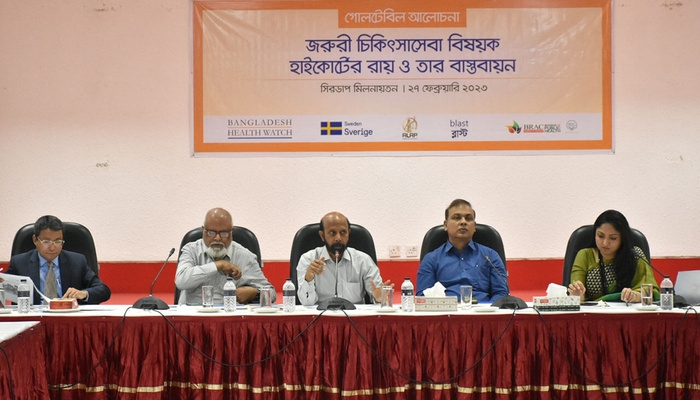
Bangladesh Health Watch (BHW), a citizen’s platform, was established in 2006 as a multi-stakeholder civil society body dedicated to improving the health system in Bangladesh through evidence-based critical reviews of policies and programs and recommending appropriate actions for change.
BHW has several thematic groups, they are; 'Thematic Group on Vaccination', 'Thematic Group on National Budget', 'Thematic Group on Health Law and Policy', and 'Thematic group on Covid-19 Research, Vaccination'. Thematic groups are formed to carry out extensive targeted advocacy activities, media-based dissemination of research/review findings, and public discussions and debates on specific issues. For the advocacy activities of this thematic group Bangladesh Health Watch (BHW) organized a roundtable discussion on ‘Guidelines and Implementation of Emergency Medical Services on 27th February, Monday, at CIRDAP Auditorium in Dhaka.
On occasion, the keynote paper was presented by Barrister Rashna Imam, Advisory Group Member, Bangladesh Health Watch. On that occasion, the special guests were Dr. Sheikh Daud Adnan, Director (Hospitals and Clinics) at the DGHS, and Dr. A B M Harun, Senior Vice President of Bangladesh Private Clinic and Diagnostic Owner’s Association.
Purpose of the Roundtable Discussion:
At the beginning of the program, Dr. Yasmin H Ahmed briefly discussed Bangladesh Health Watch. She described the journey of Bangladesh Health Watch from its inception. She also shared how BHW is managed by the Working group and Advisory group and BHW’s recent activities along with achievements.
The key presenter Barrister Rashna Imam showed the guidelines and background of the guideline in her presentation. On 18th August 2018, the honourable High Court Division approved a comprehensive set of guidelines on facilitating emergency medical services to the victims of road accidents and protecting Good Samaritans.
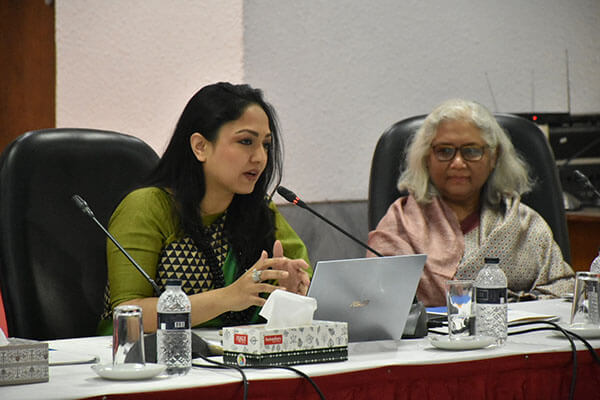
At the beginning of the presentation, she shared the background of the guidelines. In 2016, a critically injured road crash victim was taken by a good Samaritan named Saif Kamal to three different hospitals only to be refused emergency medical services. When the good Samaritan reached the fourth hospital accompanied by a sub-inspector of Gulshan Police Station, the victim was declared dead. This, in fact, is experienced by victims and their aiders across the country on a regular basis when seeking emergency medical services following critical injuries inflicted in road accidents. The common reasons behind hospitals and clinics refusing to provide emergency medical services include, among others, the medico-legal nature of the case and financial inability. Good Samaritans or aiders who voluntarily help victims of road crashes by taking them to a hospital also commonly face harassment at the hands of the hospital authorities and the police and get entangled in court proceedings.
She presented the guidelines where different points stressed different topics related to emergency medical services and the safety of a good Samaritan. Barrister Imam said that the govt should publish the guideline as a gazette and start the dissemination of the guideline. After that, the implementation process will be started.
After Barrister Imam’s presentation, the special guest shared their opinion.
Dr. Sheikh Daud Adnan stressed that the number of ambulances and other services is inadequate. Dr. Sheikh Daud Adnan says that Bangladesh Government is trying hard and soul to improve the healthcare system of Bangladesh. Nowadays, all upazila hospital and district hospital has emergency health services. “No one has any audacity to send them back without giving the victim treatment. The service providers are bound to be accountable for their work and give services to the victims,” said Dr. Adnan.
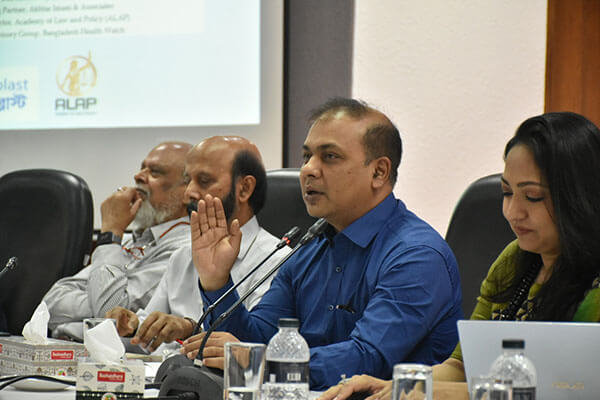
Dr. Adnan puts emphasis on the issue of capacity building for the service providers of remote areas. Also, he emphasized the well-regulation of ambulance services. He pointed out the inadequate number of human resources assigned to emergency medical services. And stress upon the issue of proper emergency training. Dr Adnan also said that the govt initiated a plan for portable Operation theatre (OT) and Mini OT in every Upazilla Health Complex. Some of them already. Dr A B M Harun, senior vice president, of Bangladesh Private Clinic, says, “People are still unknown about the guideline, so more dissemination events should be organized. The govt and its related wings should come forward to implement the guidelines.”
He mentioned that private clinics and hospitals are bound to follow WHO’s guidelines for hospitals. Moreover, the Bangladesh govt has given a circular stating that all private hospitals should have an emergency unit. The hospital owners should emphasize the issue.
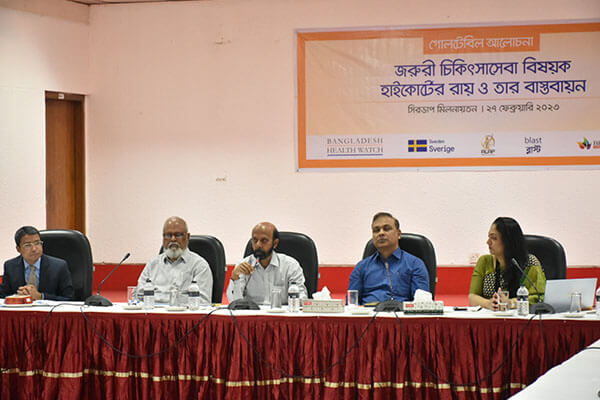
The private owner association, from their own CSR, should come forward and take some initiative to form an Emergency Medical Service Unit (EMS).
After the speech of the special guest, the moderator said that we were all aligned with one issue: everyone should get emergency medical services. Whether he/she is a road accident victim or not will not be an issue.
Dr Ahmed Muashtaque Raza Chowdhury, convenor of Bangladesh Health Watch, said, “Many of the people, even some of the public health experts, don’t know guidelines. The guidelines need more publicity so people become aware of this issue.”
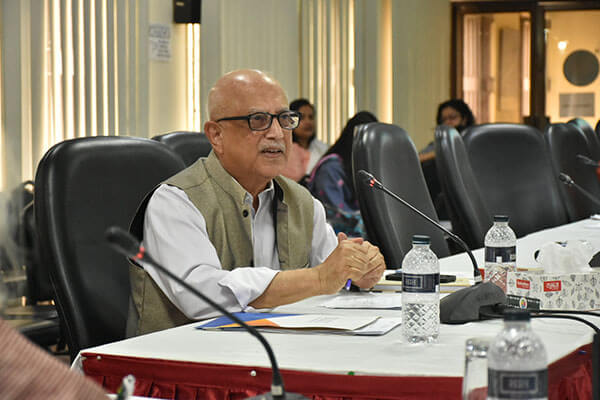
After the speech of the special guest, the moderator said that we were all aligned with one issue: everyone should get emergency medical services. Whether he/she is a road accident victim or not will not be an issue.
Dr Ahmed Muashtaque Raza Chowdhury, convenor of Bangladesh Health Watch, said, “Many of the people, even some of the public health experts, don’t know guidelines. The guidelines need more publicity so people become aware of this issue.”
After the speech of the special guests, the discussants shared their opinion. Some of the recommendations that come forward are- using Grievance Redressal System to bring out issues/complaints/problems, creating a complaint mechanism for health services, establishing a triage system in emergency rooms, forming emergency teams and building their capacity, involving Civil Defense/Fire Brigade as first responders, monitoring emergency services, purchasing equipment for emergency services from the private sector by the Government, national integrated ambulance system and trauma registry, SOP for emergency case management, training for the bystander.
Everyone urged for the implementation of the guidelines as soon as possible. Professor Dr. Liaquat Ali, Chair of the Thematic Group, in his concluding remark, thanked all for joining the roundtable and shared their valuable thoughts.
Citizen's Voice